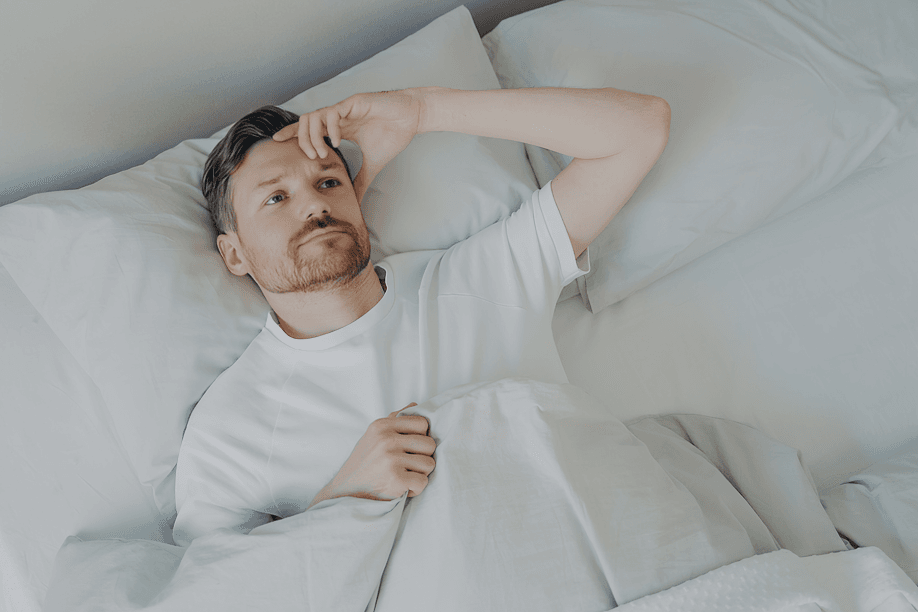
“
The stress and poor sleep link forms a vicious cycle where each issue feeds the other. When stress invades the mind, it disrupts sleep patterns, and lack of proper rest worsens anxiety levels. Understanding the science behind this link can help individuals find practical ways to break the loop and restore a healthy sleep routine.1
1
”
When cortisol, the stress hormone, remains elevated throughout the night, it blocks the natural release of melatonin, a chemical that helps regulate sleep-wake cycles and promotes deep sleep. 1
Chronic stress increases sympathetic nervous system activity, keeping the body in a state of "fight or flight," which makes falling asleep difficult and staying asleep even harder. 2

People experiencing long-term stress often develop hyperarousal, a condition where the brain remains overly alert at night, reducing the chances of entering the restorative deep stages of sleep.
Insomnia is both a cause and a consequence of stress, with research showing that people who sleep less than six hours regularly are more likely to report daily stress and emotional imbalance. 3
Job-related stress and poor work-life boundaries are leading contributors to sleep disruptions, with constant emails, deadlines, and mental overstimulation continuing even after leaving the workplace. 4
Philosopher Arthur Schopenhauer believed that peaceful sleep was essential to a balanced life, reminding us that stress not only disrupts sleep but also steals our ability to reflect and recover mentally. 5
Students facing academic stress report higher levels of sleep latency, meaning they take longer to fall asleep, often spending hours in bed with racing thoughts and elevated nighttime anxiety. 6
Poor sleep affects the amygdala, the brain's emotional center, making people more reactive to stress, forming a feedback loop that worsens both anxiety and sleep deprivation over time. 7

Nightmares are a hidden symptom of stress and poor sleep, where emotional overload triggers disturbing dreams, causing frequent awakenings and significantly reducing sleep quality.
Stress causes physical symptoms such as increased heart rate and muscle tension, which interfere with the body's ability to relax, preventing the onset of the non-REM stages crucial for full recovery. 8
Sleep specialists often observe that stress-related thoughts—like fear of failure or regret—loop endlessly in the brain at night, turning the bed into a battleground of mental exhaustion. 9
People under psychological stress often engage in poor sleep hygiene habits such as excessive screen time, irregular bedtimes, or using stimulants, further worsening their chances of quality rest. 10
Stress has been shown to suppress REM sleep, which is essential for emotional processing, meaning individuals wake up feeling unrested and emotionally drained, increasing vulnerability to further stress. 11
Chronic lack of sleep can impair the prefrontal cortex, the brain region responsible for rational decision-making, making stressful events feel even more overwhelming than they actually are. 12
Caregivers, who often manage emotional stress for others, experience high levels of sleep fragmentation, waking frequently throughout the night, and reporting less satisfaction with their sleep patterns. 13

People with anxiety disorders often describe a specific nighttime stress phenomenon called "anticipatory anxiety," where fear of the next day’s stressors prevents them from winding down.
Research shows that consistent deep sleep reduces cortisol levels naturally, suggesting that even partial sleep recovery could improve stress responses and reduce overall emotional reactivity. 14
Stress contributes to behaviors like emotional eating and late-night snacking, which disrupt digestion and affect the body’s readiness to enter a calm, sleep-supporting state. 15
Long-term sleep deprivation caused by stress is linked to memory lapses, reduced focus, and mood instability, all of which create more daily challenges and perpetuate the cycle of stress. 16
Cognitive-behavioral therapy for insomnia (CBT-I) is among the most effective methods for breaking the stress-sleep cycle by teaching individuals to manage thoughts that interrupt restful sleep. 17


